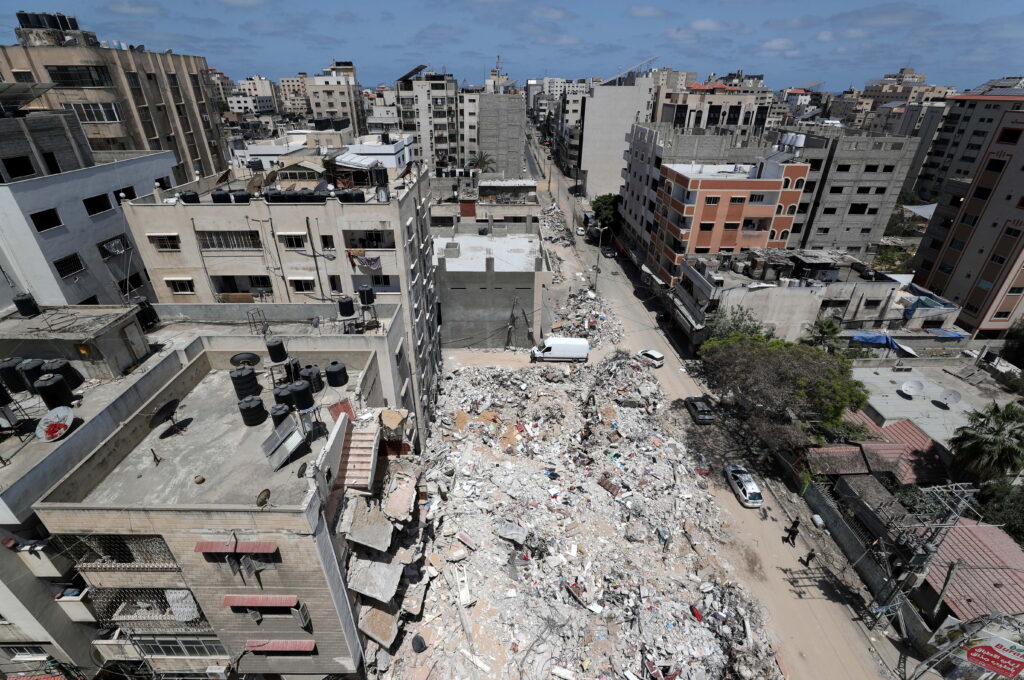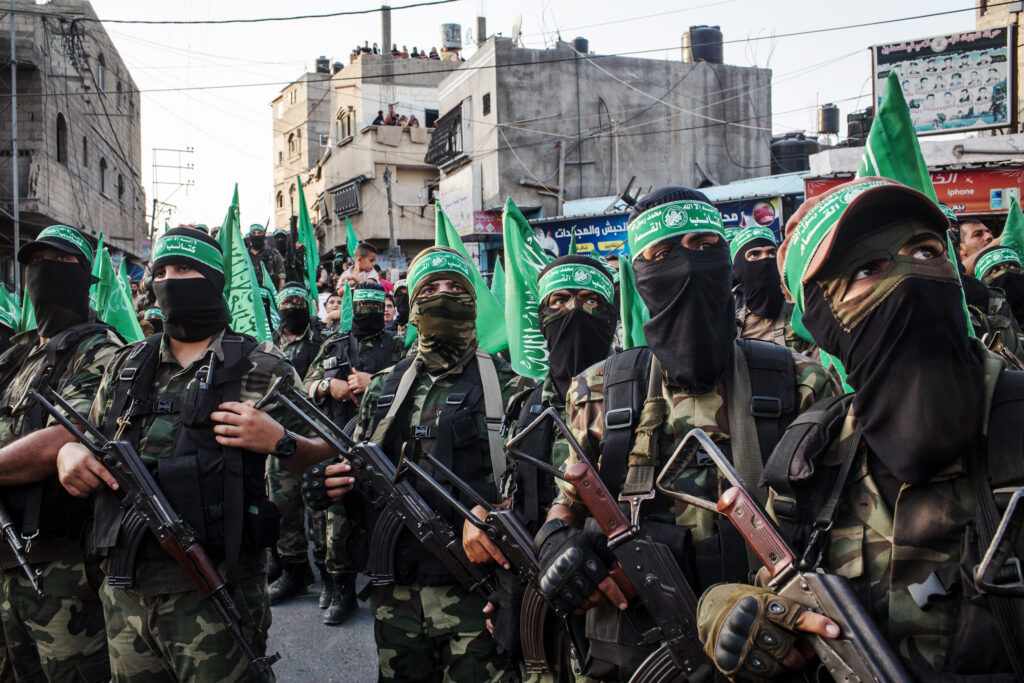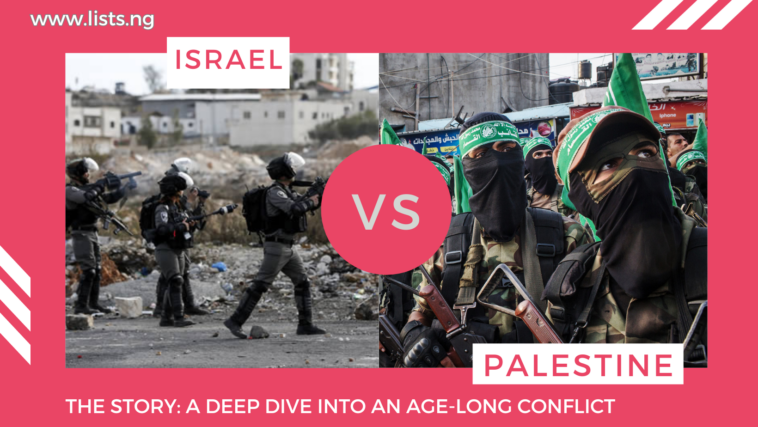The long-lasting and complex Israel-Palestine conflict is deeply connected to history, politics, and religion. It’s important to understand that many people have strong emotional feelings about this issue.
This conflict, which has resulted in the loss of tens of thousands of lives and the displacement of millions, has its origins in a colonial act over a century ago. In more recent news, Israel declared war on the Gaza Strip following an unprecedented attack by the Palestinian armed group Hamas on October 7, 2023, drawing significant global attention to the situation.
Over 1,400 Israelis lost their lives, and the Israeli military reported that 230 soldiers and civilians, including women and children, were taken as hostages to Gaza. On the Palestinian side, more than 9,000 Gazans have been killed in Israeli air and artillery strikes, as reported by the Hamas-run health ministry in Gaza.
This particular action in fact, has in other words opened another vicious chapter between these two nations.
Israel’s Defense Minister, Yoav Gallant, ordered a total blockade on Gaza, which included cutting off electricity and shutting the supply of food and fuel into the area.

The historical background of the conflict in Israel and Palestine spans more than a century. Here’s a deep dive into the history of the never ending war.
Israel is the singular Jewish nation globally, situated to the east of the Mediterranean Sea. Palestinians, who are of Arab descent and have historical ties to the land currently under Israeli jurisdiction, identify the region as Palestine and aim to establish a state with that name on all or a portion of the same territory. At the core of the Israeli-Palestinian conflict lies the issue of land distribution and governance.
While both Jewish and Arab Muslim communities can trace their historical connections to the land of the present-day Israel-Palestine region over thousands of years, the modern political conflict emerged in the early 20th century. At that time, Jewish populations, seeking refuge from persecution in Europe, aspired to create a national homeland in a region that was predominantly Arab and Muslim under the rule of the Ottoman Empire and later the British Empire.
This endeavour was met with resistance from the Arab communities, who viewed the land as rightfully belonging to them. An initial United Nations proposal to partition the land, granting separate territories to both Jewish and Arab groups, did not succeed. Subsequently, Israel and the surrounding Arab nations engaged in multiple armed conflicts over control of the territory.
Late 19th and Early 20th Century:
The Zionist movement, advocating for a Jewish homeland, gained prominence in Europe. The region now known as Palestine was under Ottoman Empire rule.
World War I and the British Mandate:
During World War I, British forces took control of Palestine. The Balfour Declaration in 1917 indicated British support for the establishment of a Jewish homeland in Palestine. Following the war, the League of Nations authorized Britain to govern Palestine.
1947 UN Partition Plan:
In 1947, the United Nations suggested a division plan that aimed to create separate Jewish and Arab states within Palestine. While Jewish leaders accepted this plan, Arab leaders rejected it, leading to the 1948-1949 Arab-Israeli War, resulting in the establishment of Israel and the displacement of Palestinians.
Post-1948:
The founding of Israel and its subsequent territorial growth resulted in persistent hostilities with neighboring Arab nations and Palestinian organizations.
A series of wars, notably the 1956 Suez Crisis, the Six-Day War in 1967, and the Yom Kippur War in 1973, played a significant role in reshaping the dynamics of the conflict and the borders in the region.
The Palestinian Liberation Organization (PLO), under the leadership of Yasser Arafat, emerged as a prominent representative of Palestinian aspirations and concerns.
ABOUT HAMAS

HAMAS, an acronym of its official name, the Islamic Resistance Movement (حركة المقاومة الإسلامية Ḥarakat al-Muqāwamah al-ʾIslāmiyyah), founded by Ahmed Yassin, a quadriplegic Islamic scholar, in the 1980s during the First Intifada (Palestinian uprising) against Israeli rule. It is a Sunni Islamist political and military organization governing the Gaza Strip of the Israeli-occupied Palestinian territories.
In the words of HAMAS Founder while speaking to The Guardian in 1988, Ahmed Yassin said “If we want a Palestinian state, we must have a Palestinian land. There is no point in making a state on paper. Our state will be islamic.” he stressed.
The organization gained prominence among Palestinians in the Gaza territory under Israeli Government, but a few years later, the Israeli government initiated a crackdown on its senior members.
Hamas’ ideology does not acknowledge the state of Israel and advocates for its removal through armed conflict in the Levant. The group has consistently opposed peace agreements that call for an end to hostilities with Israel.
Hamas is known for its armed resistance activities, as well as its involvement in Palestinian politics, where it won the Palestinian legislative elections in 2006 and has since governed Gaza.
WHY DID THEY INVADE ISRAEL THIS TIME?
As rightly reported according to REUTERS, the secretive mastermind behind the assault is Palestinian militant Mohammed Deif, dubbed it “Al Aqsa Flood:.
The term “Israel’s most wanted man” was used in an audio recording that Hamas broadcast while firing thousands of rockets from the Gaza Strip on Saturday. This suggested that the attack was a response to Israeli raids at Jerusalem’s Al Aqsa mosque.
In May 2021, following a raid on Islam’s third holiest site, which had angered the Arab and Muslim world, Mohammed Deif began planning the operation. This operation has resulted in the deaths of 1,200 people in Israel and the injury of more than 2,700, according to a source with close ties to Hamas.
The conflict was incited by the images and videos of Israeli forces entering the Al Aqsa mosque during Ramadan, where they were seen beating worshippers, carrying out attacks, and forcefully removing both elderly and young men from the mosque. A source in Gaza explained, “All of these actions served to intensify and inflame the anger.”
OTHER PARTIES INVOLVED
The US, the European Union, and other Western countries have condemned the actions of Hamas, which is designated as a terrorist organization by these entities.
Over the years, the United States, which is Israel’s strongest supporter, has provided the Jewish state with over $260 billion in military and economic assistance and has committed to supplying additional equipment, air defense missiles, guided bombs, and ammunition.
Russia and China have not condemned Hamas and have stated that they are maintaining contact with both sides in the conflict. Additionally, Russian President Vladimir Putin has attributed the absence of peace in the Middle East to U.S. policy.
Iran, Israel’s arch-enemy, is a key supporter of Hamas, as well as Hezbollah, whose militants have been exchanging fire with Israeli forces almost daily since Hamas’s attack.
A source said that while Tehran was aware a major operation was being prepared, it was not discussed in any joint operation rooms involving Hamas, the Palestinian leadership, Iranian-backed Lebanese militants Hezbollah, and Iran.
“It was a very tight circle,” the source said.
Questions have been asked about Iran’s role in the Hamas’ attack, after reports said it gave the go-ahead days before. Tehran has, however, denied any involvement.
PROPOSED CONFLICT RESOLUTION
The prevailing approach for resolving the conflict today is known as the “two-state solution,” which envisions the establishment of an independent Palestine in Gaza and most of the West Bank, while the remaining land would belong to Israel. However, despite the clarity of this concept in theory, there is a significant division between the two sides regarding its practical implementation.
An alternative to the two-state solution is the “one-state solution,” where the entire territory would become either a single, larger Israel or a single, larger Palestine. Many experts believe that this alternative would create more challenges than it would resolve, but due to political and demographic factors, this outcome is increasingly seen as a possibility in the future.





